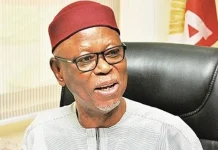The International Monetary Fund (IMF) has commended the Nigerian government for fighting corruption and carrying out tax audits.
Speaking to some journalists, TheCable inclusive, on the sidelines of the ongoing annual meetings of the IMF and World Bank Group, Cathy Pattillo, assistant director of IMF’s fiscal affairs department, urged Nigeria to do more.
“We are welcoming the growth and recovery plan and the new cabinet which is then implementing key reforms including revenue mobilization by raising the VAT rate and the 2020 budget. And reforms in various anti-corruption measures also that would reduce vulnerabilities and raise growth to higher per capita levels,
“So now is the opportunity to look at a comprehensive reform to sustainably increase non-oil revenue.”
“The government has taken welcome steps with tax audits, e-filling, closing loopholes, combating corruption in tax offices, increased exercised taxes and it also launched its strategic growth initiatives that call for this high-level committee. All of these are very welcome.
“And the article IV consultation earlier this year had our staffs recommend further VAT reforms and broadening the tax base by removing CIT exemptions and customs duty waivers.”
CAPITAL INFLOWS TO REMAIN STRONG
Tobias Adrian, Adrian, the director of IMF’s monetary and capital markets department, said the fund projects that investment inflows into sub-Saharan African countries will hit a record high in 2019.
“Flows in investment in sub-Saharan Africa has been strong and expected to reach a record high this year,” he said during the unveiling of the Global Financial Stability report.
“Global financial conditions are favourable to countries such as Nigeria, at the moment. Issuing bonds in hard currency and the domestic currency is possible because of favourable global financial conditions. And of course, It is key what countries such as Nigeria are doing with those borrowed funds. Undertaking structural reforms to develop the economy is key.”
Adrian advised that Nigeria should develop both its domestic and external debt market because they are “important for economic growth and economic development but of course any borrowing has to be managed in a responsible manner that at both costs and benefits so borrowing can be helpful for economic growth and investment but it can also be dangerous when negative shocks arise.” (The Cable)



























